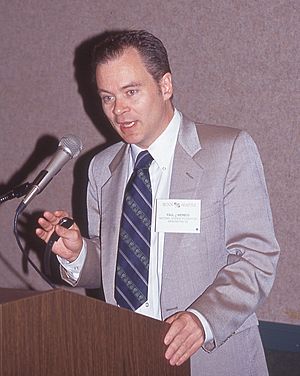Paul Werbos facts for kids
Quick facts for kids
Paul Werbos
|
|
|---|---|

Paul Werbos at the International Joint Conference on Neural Networks (IJCNN) in Seattle on 8 July 1991
|
|
| Born |
Paul John Werbos
September 4, 1947 |
| Alma mater | Harvard University |
| Known for | Backpropagation |
| Awards | IEEE Neural Network Pioneer Award (1995) IEEE Frank Rosenblatt Award (2022) |
| Scientific career | |
| Fields | Social science Machine learning |
| Thesis | Beyond Regression: New Tools for Prediction and Analysis in the Behavioral Sciences (1974) |
| Doctoral advisor | Karl Deutsch |
| Other academic advisors | Yu-Chi Ho |
Paul John Werbos, born on September 4, 1947, is an American scientist. He is known for his important work in machine learning. This field teaches computers to learn from data. Werbos was one of the first people to figure out how to train artificial neural networks. These are like computer brains inspired by human brains. He also helped create recurrent neural networks, which are special types of learning systems.
Contents
Who is Paul Werbos?
Paul Werbos is a smart American scientist. He has worked in two main areas. One is social science, which studies how people and societies work. The other is machine learning. This is a part of artificial intelligence (AI). AI is about making computers smart enough to do tasks that usually need human intelligence.
Early Discoveries in AI
Paul Werbos made a big breakthrough in 1974. He wrote a special paper called a dissertation. In this paper, he explained a new way to train artificial neural networks. This method is called backpropagation. It helps computers learn from their mistakes.
What is Backpropagation?
Imagine you are teaching a robot to play a game. If the robot makes a mistake, you tell it what went wrong. Backpropagation is similar. It's a way for a computer to learn by looking at its errors. The computer figures out how much each part of its "brain" contributed to the mistake. Then, it adjusts those parts to do better next time. This process helps the computer get smarter over time.
Recurrent Neural Networks
Werbos was also a pioneer in recurrent neural networks. These are special types of neural networks. They have a "memory" of past information. This makes them very good at understanding things that change over time. For example, they can be used to understand speech or predict what might happen next in a sequence.
Awards and Recognition
Paul Werbos's work was very important for the field of AI. Other scientists recognized his contributions.
Leading the Way in Neural Networks
He was one of the first leaders of the International Neural Network Society (INNS). This is a group for scientists who study neural networks. He helped guide the society for two years.
Special Awards
In 1995, Paul Werbos received a special award. It was the IEEE Neural Network Pioneer Award. This award honored him for discovering backpropagation. It also recognized his work on other ways computers can learn. One of these is called Adaptive Dynamic Programming. In 2022, he received another important award, the IEEE Frank Rosenblatt Award.
Beyond Machine Learning
Paul Werbos's interests go beyond just machine learning. He has also explored other complex topics.
Exploring Physics
He has written about quantum mechanics. This is a part of physics that studies the smallest particles in the universe. He also looks at other areas of physics.
Big Questions About Life
Werbos is also interested in bigger questions. These include ideas about consciousness. This is what makes us aware and able to think. He also thinks about the basic rules of physics. And he explores the amazing things humans can achieve.
Work at the National Science Foundation
For several years, Paul Werbos worked at the National Science Foundation. This is a U.S. government agency. It supports research and education in science and engineering. He served as a program director there until 2015. In this role, he helped decide which science projects would receive funding.
See also
 In Spanish: Paul Werbos para niños
In Spanish: Paul Werbos para niños

